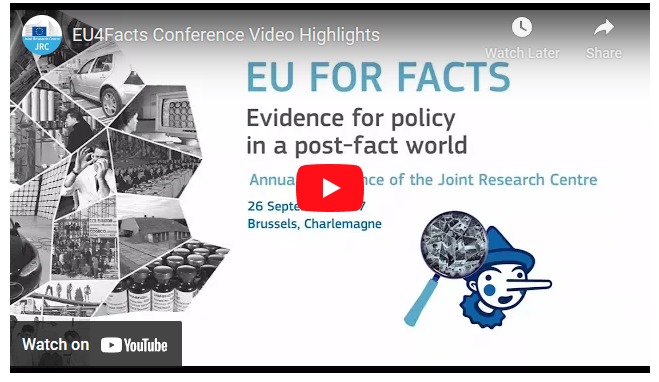The Evidence-Informed Policy Making team is part of the Science for Democracy and Evidence-Informed Policymaking Unit at the European Commission’s Joint Research Centre (JRC.S2). Our main aim is to support researchers and policymakers to build and establish better connections between scientific knowledge and policymaking. We strive to position the JRC as a global thought leader in the science for policy field. These are our priority lines and some of our actions to fulfill them:
- Creating new knowledge about concepts and methods at the science and policy interface,
- The Enlightenment 2.0 programme provides an evidence base to help maximize the policy impact of scientific knowledge, throughout the policy cycle. The multi-annual research programme seeks to understand the different drivers that influence political decision-making in the 21st century.
- We develop professional development frameworks for both scientists and policymakers to use scientific evidence to underpin learning and development strategies.
- Building capacity in researchers and policymakers in knowledge management for policy,
- We organise an introductory course in evidence for policy for JRC scientists, summer schools using games and masterclasses for researchers and policymakers from the Member States, Neighbourhood and Africa
- We organise a training for policymakers in using evidence.
- We wrote a handbook on evidence for policy that marries the latest research to the JRC's best practice experience for a global audience.
- We run a Training of Trainers programme to foster a network of facilitators across the European Union to train scientists to operate in the science for policy interface.
- Strengthening science for policy eco-systems across the European Union by providing advice on public administration reforms and co-creating new approaches,
- We organise the “Strengthening and connecting eco-systems of science for policy across Europe” workshop series to take stock, discuss and exchange experiences. This helps us cocreate ideas and projects for the design and implementation of new structures, mechanisms and instruments for strengthening evidence-informed policy-making across Europe.
- Nurturing a European and global community of those professionals committed to evidence-informed policy,
- We are fostering a European network of .active stakeholders in the science for policy ecosystems across Member States.
- We actively engage with other key actors at the European Union level such as the Science Advice Mechanism (SAM), Science Advice for Policy · by European Academies (SAPEA), European Science Advisors Forum (ESAF), but also at the global level through collaboration with the International Network for Government Science Advice (INGSA) and other international organisations.
For Enlightenment 2.0 related enquires: JRC-ENLIGHTENMENT2@ec.europa.eu
For enquires related to institutional and skills aspects of evidence-informed policymaking: JRC-E4P-ECOSYSTEM@ec.europa.eu
Link to evidence for policy community
| Originally Published | Last Updated | 04 May 2021 | 18 Jul 2024 |
| Related project & activities | Strengthening and connecting science for policy ecosystems across the EUUnderstanding our political nature: how to put knowledge and reason at the heart of political decision-making Technology and Democracy: understanding the influence of online technologies on political behaviour and decision-makingValues & Identities - a policymaker's guideTrustworthy Public Communication |
| Related organisation(s) | JRC - Joint Research CentreEC - European CommissionSAPEA - Science Advice for Policy by European AcademiesGroup of Chief Scientific AdvisorsINGSA - International Network for Government Science Advice |
| Knowledge service | Metadata | Evidence-Informed Policy Making | Learning & DevelopmentScience for Policy EcosystemsEnlightenment 2.0 |
| Digital Europa Thesaurus (DET) | Knowledge4policy |
International Call for Experts on ‘Challenges and opportunities for the Future of Democracy’ project
Trustworthy Public Communication
Competence frameworks for policymakers and researchers
Share this page

